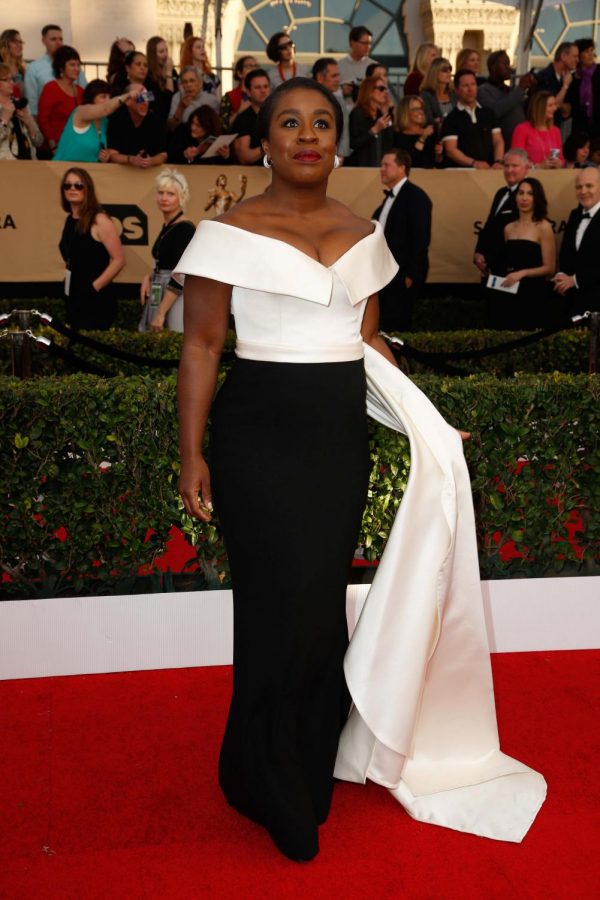Put some respect on my name
Oct 25, 2017
Columnists’ opinions are their own and may not necessarily represent the views of The Daily Illini.
What do you call a person who knows two languages? Bilingual. What do you call a person who knows multiple languages? Multilingual. What do you call a person who knows one language? Closed-minded.
Recently, actress Uzoamaka Aduba, known for her role as Suzanne “Crazy Eyes” Warren on “Orange is the New Black,” spoke at Glamour’s “The Girl Project” rally, and specifically discussed her former discomfort with her name.
She spoke about her desire for people to refer to her as “Zoey” growing up because she thought it would be easier for people to pronounce it. After talking with her mother about being distraught because of her name, her mother explained to her, “Why … If they can learn to say Tchaikovsky, Michelangelo, and Dostoevsky, then they can learn to say Uzoamaka.”
After her mother’s reaction to her request, she never asked again; later, she learned to grow into and own her name.
Get The Daily Illini in your inbox!
A lot of people in today’s society forget that there are many other young men and women who struggle with accepting their names. What’s worse for people who do take pride in their name and the strong cultural ties it has, some people don’t want to take the initiative to learn how to pronounce it and resort to giving them nicknames instead.
More often than not, these name bearers’ choices of whether to keep said nickname or to ask people to refer to them by their birth name is taken away from them.
This is deeper than just someone’s name. The foundation of what our society is built on acknowledges national pride and the neglect of anything “foreign.” This in itself is oxymoronic since our society is a melting pot of different cultures from all over the world.
Historically, African slaves were forced by their slave masters to be referred to by their American names after being traded to further incorporate them into American culture.
Elisabeth Pearson Waugaman, Ph.D., explains, “Slave names are only registered after the beginning of the international abolitionist movement circa 1820. Sold into slavery, slaves were given Anglicized names.”
Even certain Latinx individuals have been encouraged to change their names in an effort to “make it easier for people to pronounce.” Some of them include Soledad O’Brien, “Psych” star James Roday and Charlie Sheen.
In addition to the nation’s historical encouragement to neglect an individual’s culture through name changes as an effort to Americanize, we also tend to refer to people by their continental affiliation. For example, we tend to lump all “Asians” or “Africans” together as an effort to make it easier for ourselves.
It’s important to remember that Indians may have different cultural practices than Chinese, just as Ethiopians may have different cultural practices than Nigerians. Both historically and in current times, we tend to take short cuts to make everything easier for ourselves as Americans.
A lot of people notice the differentiation between Americans and anyone who doesn’t fit that cookie cutter, but some aren’t as open to explain or speak about how their name is a reflection of their culture.
Fortunately, there are individuals who both notice it and want to speak about their own experiences with their names. Valerie Lee, a junior in FAA, explained, “after being raised in America and having a culture class, that made me realize that I have lost a part of my parents identity. They were raised in Taiwan and they have all of these cultural values, that’s why they gave me a Chinese name … living in America cuts it in half because we are not affiliated with our culture and we aren’t immersed in it. There is an association with ‘different’ with a Chinese name … there’s a lot of things you can assume about the person, whereas with an English name there is kind of a blank slate.”
It’s off-putting that we, as a nation, have to expel this notion that in order to fit in or be a true American, one must possess a rather American-sounding name.
It’s unfortunate that when we fill out job applications, someone like Valerie would have to use her American name for fear that not only will the interviewer butcher Limengxin, but also that there is an assumption attached to that name.
Why can’t Valerie and Limengxin be equally accepted in today’s society? A UCLA study reconfirms the different associations attached to names, with participants associating Latino sounding names with people who were “larger, more violent and lower in socioeconomic status.” It also explained that “study after study seems to show that people with names that sound Latino or black are often the subjects of discrimination.”
I think there is a solution for everyone. We can fix our ignorance to culture and the names that represent it by taking the time to learn more about them. If we stop dumbing things down with nicknames and shortcuts, we can broaden our knowledge. With this newfound knowledge, people would be able to open their eyes to the beauty that different cultures embody.
So if you happen to have the opportunity to meet a Chunhua, Baozhai, Aadhaya, Jyothi, Akosua, Boluwatife or Taofik, take the time to learn their name, because there’s nothing more fundamentally American than respecting and embracing the beauty of other cultures.
Myla is a junior in LAS.






